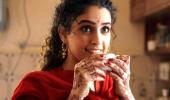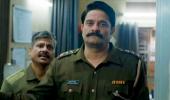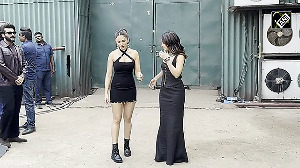'It is, in a way, my mother's story.'

Like many of us, Arati Kadav first saw Jeo Baby's critically acclaimed Malayalam film The Great Indian Kitchen during the lockdown in 2021.
The movie that delves into the unpleasant realities of a patriarchal household resonated with Kadav and reminded her of her mother's story to a certain extent.
When the opportunity came, she helmed the Hindi makeover Mrs with Sanya Malhotra, even though the remake felt like a 'very challenging task'.
Best known for the Vikrant Massey starrer Cargo, a sublime dark comedy currently streaming on Netflix, Kadav says crafting the feminist tale in Mrs was her own kind of activism.
"Our moms make food day in and out and are never appreciated for it. It's sad," Kadav tells Mayur Sanap/Rediff.com.
What did The Great Indian Kitchen make you feel when you first saw it?
I was genuinely moved.
That was the first time a film spotlighted the invisible labour that our mothers have been doing.
I realised that we don't realise how the gender roles shape us, or how social conditioning shaped me also. I am guilty of this.
I am also guilty of treating my mother as a function.
You feel it's a small work, that they just make the food, but it's a lot of work and a lot of physical work.
I have seen women wanting to remain invisible because they themselves want to disappear in those roles.
It must have felt daunting to remake such a hugely acclaimed film.
When you remake a cult classic, it's usually a tough act to follow. You're always slightly worried.
But we made this film with a lot of sincerity and passion and love, both for the subject and our intended audience.

The film has shots of scrumptious cooking, but the food feels repulsive because it makes you feel the toil someone puts into it.
Yes, that was the idea. We take so much for granted.
I don't think my father has ever cooked. But if he did, like maybe some pakora or something, it would become such a huge thing that oh look, he did that.
Our moms make food day in and out and are never appreciated for it. It's sad.
In an interview you once said you didn't want to Bollywoodise this film. What do you mean by that?
See, I really wanted to make the film accessible for the North Indian audience. But I also wanted to be true to the essence of the original.
And for that, I cannot add the classic Bollywood elements like the song and dance.
Even the look and feel of how the houses are (needed to be different).
We had to make the house look realistic and yet slightly lovely because that's my aesthetic.
It was also the house of the mother-in-law. I thought her passion has come inwards into the house, so she would have chosen the tea cup, the tiles, she would have kept her house nice. That was the idea.
I wanted to have good shots but didn't want it too much jazzish.
The music had to be subtle.
The actors shouldn't be too melodramatic.
I wanted to arrive with the right tone which is not as dark as original because the sensibilities of the Malayalam film audience are very different than the sensibilities of North Indian audience.
I adapted for that, without going all-out masala.
Why did you choose Delhi as the setting for this story?
North India could have been Bihar also but I thought the audience would feel that a Delhi doctor (the husband character played by Nishant Dahiya) might be an open-minded person but actually, it is not like that.
Also, the region lent itself well with the whole Kayastha cuisine that we show in the film.
I have grown up in Chhattisgarh, which is close to those kind of towns.
I understand that lingo well. I thought I could do good justice to it.

How much of your own experiences and observations have contributed to the film?
A lot. The husband is a very well earning man and the wife is in a profession like dance, which might not feel like directly contributing to society or feel like she may earn enough.
That was the kind of power structure I was in during the early years of my marriage.
Richa did not have a job when she gets married. That thing of finding her feet came from my personal life.

The men in this film are a product of their social conditioning. How did your male actors react to some of those scenes?
Kanwaljitji (Singh) joked that his wife should not know that he was playing this role.
He is actually a very well read person.
He said that this is in the DNA of most Indian men. They don't realise that they are being wrong or they are hurting.
He said that in their head they are just being right. For a lot of men, they have no idea that how entitled they are.
Nishant (Dahiya), who plays the husband Diwakar, said that I am not the villain, only my conditioning is wrong. So I will play him like that.

How did Sanya Malhotra transform into Richa?
The way she committed herself to the role, I have not seen anyone do that.
She had a diary entry for every scene.
She did a sort of micro-surgery on Richa's psyche about her gradual erosion, like what kind of person she is, how much this thing is hurting her.
Richa is a much softer person. She's just trying to adjust because she just got married, so she's finding her bearings.
The word 'adjust' is very complicated and loaded in women's culture.
Both of us spoke to a lot of women and that kind of shaped the understanding of the subject very well.
Did you have any discussions with Jeo Baby about Mrs?
No. I really wanted to, but I couldn't.

Your earlier films Cargo, Time Machine, Astro & Parrot were such fiercely original films. Did you have any apprehension about doing a remake?
I had a lot of apprehensions because I have been known for original work.
When you do a remake of a cult classic, people already have a very strong relationship with original material.
I felt like I was taking up a very challenging task.
But this story really resonated with me.
It was very close to home. It is, in a way, my mother's story.
Sanya had once said a very nice thing to me: We don't do activism in terms of speeches or social media posts but through work.
My superpower is film-making.
I wanted to make this film to start a conversation. It was not like a career stride or anything.

Do you think the challenges for a woman filmmaker are different than that of a male counterpart?
Challenges are there especially in your early years because nobody takes you seriously.
It's very easy to dismiss you.
I'm a soft-spoken filmmaker, so people would talk over you sometimes.
I went through that phase. But I learned to navigate my way.
It was important for me to build my team, who trusts me and who insulates me from such prejudices.
I also do very strong prep. I know 10 times more than everyone else on my sets (Laughs).
How do you look at the change that the likes of filmmakers like Payal Kapadia (All We Imagine As Light) and Shuchi Talati (Girls Will Be Girls) brought in with their incredible work last year?
Oh, I am a huge fan of both their films. Both films deeply moved me.
I have so much admiration for their journey. They made such wonderful films independently that won a lot of awards and recognitions outside India.
Just a year ago, everybody was saying was saying that the independent cinema is dead, nobody wants to see that.
I feel these two women filmmakers revived the independent cinema so much that I am talking to a lot of people who say it is okay if there's no backing from the studio, we will make a film independently.
What new opportunities do you hope Mrs should bring to you?
It should give me opportunities to make my own films effectively with a good budget.
This is a sort of my coming-of-age also like the way it is Richa's coming-of-age.
It is slightly more mainstream than my last film Cargo, so it is touching a lot more people. Cargo also had a lovely set of people really connecting to it.
But with Mrs, I'm going to a different set of audience.












 © 2025
© 2025